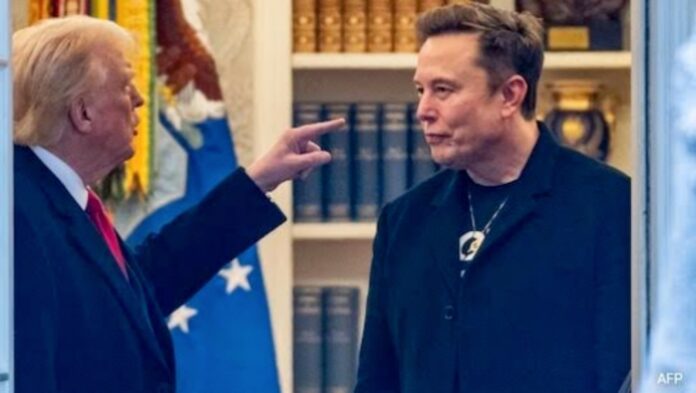By Munya Gwisai
8 June 2025
In the unfolding drama of 21st-century capitalism, few conflicts are as telling—and as historically charged—as the one between Elon Musk and Donald Trump. This is no mere clash of personalities or egos, though both men possess those in abundance. It is, at its core, a struggle between two fundamentally opposed visions of capitalism itself. It is a symptom of a deeper, inescapable contradiction tearing at the very heart of the capitalist system today.
Elon Musk: The Vanguard of Globalised Capitalism
Elon Musk stands as a prophet of globalised capitalism—a man whose fortune is inseparably tied to the seamless, borderless flow of capital, labour, and technology. Tesla builds its cars using rare earth minerals mined in the Global South, batteries manufactured in China, and software written by global engineers. SpaceX launches satellites that form a planetary communications mesh, while Starlink connects remote corners of Earth to the internet’s vast capitalist marketplace. His ventures are not American businesses per se—they are planetary enterprises riding the wave of a new world economy that emerged after the 1980s.
At the epicentre of Musk’s empire lies China—a country that, far from being a mere factory of the world, has become the dynamic core of global productive forces. With its massive industrial capacity, technical labour force, and rapidly advancing tech ecosystem, China represents what capitalism has become: integrated, transnational, and increasingly post-national.
Donald Trump: The Reactionary Nationalist
In stark contrast, Donald Trump embodies a different kind of capitalism—the older model of the capitalist nation-state. His “America First” nationalism, his trade wars with China, and his desperate nostalgia for a past industrial age all reflect a reactionary attempt to reverse the tide of history. Trump wants to return to an America where capitalism was national: American factories employing American workers producing for American markets. In short, he seeks to revive a world that no longer exists.
His MAGA vision is not just a political slogan—it is a doomed project to reassert the national capitalist model at a time when the global economy has already transcended it. It is a project driven by fear: fear of the rise of China, fear of global labour competition, fear of losing grip on the levers of economic and cultural power. And it is a project rooted not in progress but in backlash, xenophobia, and a dangerous flirtation with authoritarianism.
The Fundamental Contradiction of Modern Capitalism
What we are witnessing is not just a political rivalry, but the expression of a deeper contradiction that modern capitalism cannot resolve:
the contradiction between the capitalist nation-state—under which capitalism was born and grew—and the globalised economy, driven by advanced technologies, global supply chains, and a transnational working class.
This contradiction is not unique to the United States. It is erupting everywhere—from Brexit in the UK to Modi’s India-first policies, to the far-right surges in Europe. Everywhere, the nationalist wing of capital tries to pull economies inward just as the logic of capital itself continues to flow outward.
But the contradiction is structural, not personal. It cannot be resolved within the framework of modern capitalism. The nationalist capitalists, like Trump, rage against globalisation, while global capitalists like Musk depend on it for their fortunes. Yet both are trapped.
Musk cannot do without China, but he cannot politically align with a state increasingly at odds with the U.S. empire.
Even more critically, global capitalists like Musk still need their states in a world still divided and dominated by powerful nation states.
To fight for markets such as the US did to force South Africa to open up for Musk’s Starlink without BEE restrictions. Or protection from competition as the banning of Huawei, Tik Tok in the US market. Or for huge subsidies and preferential contracts as Musk has benefitted from the US state and now under threat from Trump.
On the other hand Trump cannot resurrect American manufacturing he’s long since helped offshore. Both are symptoms of a deeper historical impasse.
The Only Solution: Global Revolution
This contradiction points to only one viable solution: the abolition of the capitalist nation-state and its replacement by a world socialist federation—a global democratic state marked by the global, free movement of labour and people. Abolition of private property and its replacement by socialised property under democratic public control producing for human needs and not private property.
Only the above framework can match the now-global nature of production, supply, communication and immense productive capacity of society.
But such a transformation cannot come from billionaires like Musk or reactionaries like Trump. It must come from below, from the global working class, united not by borders but by shared exploitation—and the collective capacity to build a new world. This means:
Expropriating the immense wealth of the global billionaire class and placing it under public ownership.
Democratic planning of the global economy to meet human needs, not private profit.
Abolishing the chaos of the market and replacing it with rational, ecological, and just production.
Building international revolutionary socialist parties rooted in the working class, dedicated to mass struggle, and composed of disciplined, committed cadres.
This is not utopia. It is the logical next stage in human history—if we can break the resistance of the ruling elite.
To paraphrase the 21st century scientist, Steve Hawking: AI driven machines will have the capacity to produce almost everything we need. But who shall benefit from this will depend on how things are distributed: a luxurious life of leisure for everyone if the machine-produced wealth is shared equitably.
Or unimaginable wealth for the tiny core of machine-owners and mass misery and poverty for the bulk of society if the machine-owners manage to control the state and stopped equitable redistribution of wealth.
20th century scientific giant, Albert Einstern, much earlier came to the same conclusion. That movement to socialism was the only way forward for humanity to transcend the fundamental limitation capitalist private property relations now placed on the advancement of technology and society. His 1949 article, “Why Socialism” is a must read.
Conclusion: A Titanic Battle for the Future
The Musk vs Trump conflict is not merely about policy or party. It is a symptom of the deepest crisis of capitalism since its birth. The old model—national capitalist economies—is collapsing under the weight of a globalised, digitised, neoliberal and AI-driven economy. Yet the new world that has grown in the womb of the old capitalist society, the global society demanded by the productive forces, cannot be born within the constraints of capitalism.
Per Italian revolutionary, Gramsci the crisis of the interregnum consists in that the old is dying but the new cannot be born.
Or the mother – featus struggle in the womb that l like to give my students in the Philosophy module on the 2nd and 3rd laws of dialectical materialism. That is change from the quantitative to the qualitative, and the old having to give way to the new – “Bvuma” per Oliver Mtukudzi.
At the 9th month, the contradiction between the featus and mother has reached a rupture point, an antagonistic contradiction. The two can no longer continue to co-exist in the mother’s womb.
Birth, with all its pain, is the successful resolution of the contradiction. But it is not the only possible outcome. Sometimes it is death: of the child, or mother or both.
Polish revolutionary, Rosa Luxembourg, summarised the options facing humanity dramatically: socialism or barbarism.
The future, the succesful resolution of this fundamental contradiction of capitalism and advancement of humanity, will not be determined by Musk or Trump or the billionaire class. A class that as we see in the on-going genocide in Gaza, or in the killing fields of Ukraine, is ready to risk nuclear extermination of humanity for its profits and privileges.
It will be determined by whether the only class, with the necessary social weight, strategic, global positioning and necessary objective interest in the birth of the new world, i.e. the international working class, can rise to meet the demands of history to organise and lead international socialist revolution. That is the fundamental task of our time. And it is not just urgent—it is existential and why you must join the revolutionaries.






